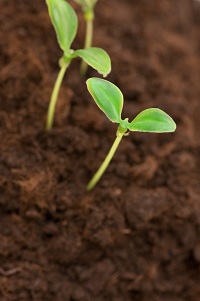Start an Organic Garden
Organic Gardening is the way Nature intended its vegetables, herbs and
fruits to be grown.
 The
first item is to decide how you will define "organic." The definition of
organic has been bandied about in the labeling wars, but when referring
to a garden, it's really about pesticides and fertilizers more than
anything else. An organic garden has no chemical from any source
that would not be biodegradable or would be harmful to birds or
wildlife. However, some "organic" gardens have synthetic substances,
others do not. Decide for yourself and consider everything that goes
into the garden.
The
first item is to decide how you will define "organic." The definition of
organic has been bandied about in the labeling wars, but when referring
to a garden, it's really about pesticides and fertilizers more than
anything else. An organic garden has no chemical from any source
that would not be biodegradable or would be harmful to birds or
wildlife. However, some "organic" gardens have synthetic substances,
others do not. Decide for yourself and consider everything that goes
into the garden.
Planning is crucial to a successful organic garden. You need to consider
the layout of your plots. North-facing gardens in the southern
hemisphere and south-facing gardens in the northern hemisphere are best.
If your area is windy, you will need to find solutions for this, too.
Fencing and wind barrier plantings are popular ways to block excessive
wind.
Having water close by is just as important. Installing an irrigation
system with a timer is an ideal way to go. It will make the difference
between enjoying your garden and being a slave to it. If you are
planting trees and shrubs, check what their mature size will be. Many
shrubs and trees are difficult to move. Trees will grow and make shade,
so don't forget they do this. Sun-loving plants and flowers can't thrive
in the shade.
Considerations for Your Garden
 »
You want to place your garden somewhere that
gets at least six hours of sunshine and is close to a source of water.
You want to be sure the soil drains well. Consider building a raised
bed. It will ensure good drainage as well as keeping the soil suitably
warm.
»
You want to place your garden somewhere that
gets at least six hours of sunshine and is close to a source of water.
You want to be sure the soil drains well. Consider building a raised
bed. It will ensure good drainage as well as keeping the soil suitably
warm.
» Next, weed the garden area thoroughly. Mow,
pull and dig up their roots. Till the soil and rake it smooth.
Make sure there are no more sprouts. If so, pull them out as well.
» You want great nutrient-rich soil for your
garden. You can make your own compost with organic materials.
Use fallen leaves, pulled weeds before they go to seed, eggshells,
coffee grounds and grass clippings. You can also purchase it at a
local nursery. Till this into the soil to feed your plants, and use
leftovers as mulch. You want at least six inches of loose soil.
» Only use plants that will thrive in your
region. Make sure to choose plants that are right for your
hardiness zone. Look for plants that have a proven record of success
and disease resistance. And always start from seeds. Nursery plants
will most likely have some amount of chemical fertilizer or pesticide
on them.
» Tend your garden well. A small organic
garden that thrives is more important than a large one that fails. Use
heaps of organic mulch to help suppress weeds. Try wood chips or grass
clippings. The mulch will also keep the soil moist so you don't need
to water as often. Use friendly insects, like ladybugs, to help keep
your garden healthy and organic!
Let Us Help You
You can start enjoying the healthy benefits of indoor and outdoor organic gardening on any scale, today. From a small herb garden for your kitchen, grown in an attractive compact garden system, to a basement dedicated to plant propagation or production gardening, there's a system to match every budget and need.
